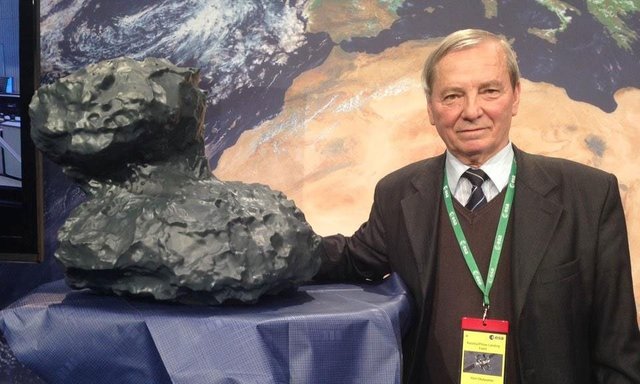On October 15, 2016, a sorrowful message appeared from seemingly nowhere: a famous astronomer, science enthusiast, physics and math PhD, member of Ukrainian National Academy, and the director of the Planetarium in Kiev Klim Ivanovich Churyumov died.

Klim Churyumov and a 3D model of Comet 67P/Churyumov-Gerasimenko, Image Credit: ESA/C.Carreau
The news was unexpected. Just on September 29-30, during the end days of “Rosetta” mission, he was reading a series of lectures in the Moscow Planetarium, invigorated and energetic.
The name of Klim Ivanovich Churyumov will forever stay in history of astronomy due to a multitude of circumstances luckily coinciding. The Comet 67P/Churyumov-Gerasimenko was the first to become a goal of a serious space expedition. Never before, had a comet experienced a soft landing of a spacecraft or had been companioned by one. This space expedition was the first detailed study of a comet. The coincidence is that 67P/Churyumov-Gerasimenko was discovered in 1969 and had never attracted any attention being fairly shy among dozens of other similar space bodies.
However, it became the only possible destination for European spacecraft “Rosetta”. Actually, the spacecraft was built to fly to another comet, but a small technical inconvenience compromised the launch window – a period of time optimal for the spacecraft to reach the previously designated comet. Astronomers hastily started searching for another comet. The one and only reachable was 67P/Churyumov-Gerasimenko. That was the day when soviet astronomers who studied comets became worldwide famous celebrities.
During his last years, Churyumov worked as the director of the Kiev Planetarium and it was a tough job. Even rich Moscow had closed its planetarium for nearly 20 years. In Kiev planetarium had not stopped working even for a moment since Soviet times and keeps working today. In a plethora of ways, this is due to efforts from Klim Ivanovich. The examination of the comet is concluded and so is the astronomer’s life. A paradoxically happy ending.